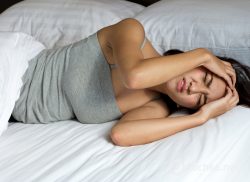 Waking up to a dull, pulsating pain in your temple is hardly the way that you want to start your day.
Waking up to a dull, pulsating pain in your temple is hardly the way that you want to start your day.
Yet it’s not at all uncommon: 50 percent of migraines (headaches so intense that they’re debilitating) strike between 4:00 am and 9:00 am. It’s no wonder, then, that 80 percent of regular migraine sufferers wake up still feeling tired.
But before you blame your headaches for disrupting your sleep, it’s worth considering how your sleep habits could be causing them.
It’s logical that sleep and headaches go hand in hand since the same regions of the brain control both.
Headaches are two to eight times more common among people with sleep disorders than they are among the overall population. But there is hope: When migraine-suffering women were coached about how to improve their sleep habits, their migraines became less frequent and less intense.
ICYMI: Sure ways to lose that stubborn belly fat
While virtually any sleep problem can be to blame for an aching head, these are some of the most common nocturnal woes that tend to be associated with headaches and migraines.
Insomnia
Sleeping too little can be a trigger for headaches. As if tossing and turning at bedtime and waking in the middle of the night or early in the morning isn’t painful enough on its own, insomnia is the chief sleep complaint of headache sufferers. Lying awake often leads to anxiety and depression—and not getting enough slumber. But treatment, which may involve specialized therapy or medication, can help with getting more rest and reducing headaches. Just don’t go overboard as sleeping too much can also be a factor for headaches.
Snoring
If your partner complains about your midnight log-sawing sessions, and you complain about waking up with headaches, it’s a good idea to talk to your doctor. Snoring is a risk factor for chronic headaches, and it can also be a symptom of sleep apnea, a dangerous condition in which you briefly stop breathing during the night.
Tooth Grinding
Also known as bruxism, clenching your jaw and grinding your teeth during the night can lead to waking up with an aching head. Along with finding healthy ways to manage stress, like exercise and meditation, improving your sleep hygiene habits may help to prevent nocturnal grinding—and the headaches that can come as a result.
Using the Wrong Pillow
Yes, it can actually be that simple. Tension headaches happen when your neck and scalp muscles are strained, especially if they’re held in the same position for a long time (as in, overnight!). Choose a pillow that keeps your head and neck in a neutral position, as if you were standing. And avoid sleeping in too cold of a room, which can also cause head and neck tension, triggering a headache.
Culled from sleep.org


Comments 5